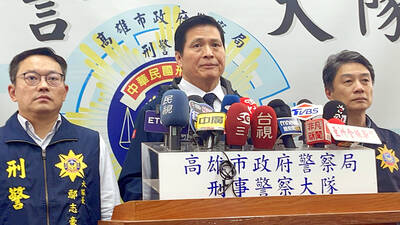A seven-year-old from China’s Zhejiang Province who came to Taiwan last week to receive “electronic ears” after being diagnosed with large vestibular aqueduct syndrome was overjoyed at her new-found ability to hear when she attended a press conference on Tuesday.
“I can hear!” said the child, identified only as Wen-wen (文文), while hugging her mother at the press conference.
Also present at the conference was 11-year-old San-san (三三), who also traveled from China to Taiwan for surgery at the Cheng Hsin Rehabilitation Medical Center in suburban Taipei.
The two young patients seldom talked to others and could not hear well since birth, said a doctor at the press conference, adding that the situation worsened for Wen-wen after a fall in which she injured her ear.
Chen Kuang-chao (陳光超), director of the otolaryngological department at Cheng Hsin center, said that large vestibular aqueduct syndrome is a connatural disease of one or both ears, often accompanied by sensorineural hearing loss that gradually leads to deafness.
The best way to improve a patient’s hearing is to implant “electronic ears,” Chen said.
“Electronic ear surgery costs 250,000 yuan [US$36,400] in China, a procedure that not only leaves big wounds but also fails to preserve the remnants of an individual’s original listening ability,” Chen said.
“The surgery costs about 220,000 yuan in Taiwan, with more skillful surgeons and preservation of residual hearing,” San-san’s mother said.
Chen said he used minimal invasive surgery on Wen-wen, which did not require shaving the head and left a scar of only about 2.5cm.
Moreover, the technique used in Taiwan takes only three hours, or half the time it takes for conventional surgery, and requires only an overnight hospital stay, Chen said.
He added that he had performed the procedure more than 100 times with no complications.
Chen said the two children were so curious and excited by their new sense that they stomped on the ground and banged the lids of trash cans, creating a lot of noises they had never been able to clearly hear before.

Twenty-four Republican members of the US House of Representatives yesterday introduced a concurrent resolution calling on the US government to abolish the “one China” policy and restore formal diplomatic relations with Taiwan. Led by US representatives Tom Tiffany and Scott Perry, the resolution calls for not only re-establishing formal relations, but also urges the US Trade Representative to negotiate a free-trade agreement (FTA) with Taiwan and for US officials to advocate for Taiwan’s full membership in the UN and other international organizations. In a news release announcing the resolution, Tiffany, who represents a Wisconsin district, called the “one China” policy “outdated, counterproductive

Actress Barbie Hsu (徐熙媛) has “returned home” to Taiwan, and there are no plans to hold a funeral for the TV star who died in Japan from influenza- induced pneumonia, her family said in a statement Wednesday night. The statement was released after local media outlets reported that Barbie Hsu’s ashes were brought back Taiwan on board a private jet, which arrived at Taipei Songshan Airport around 3 p.m. on Wednesday. To the reporters waiting at the airport, the statement issued by the family read “[we] appreciate friends working in the media for waiting in the cold weather.” “She has safely returned home.

ON PAROLE: The 73-year-old suspect has a criminal record of rape committed when he was serving in the military, as well as robbery and theft, police said The Kaohsiung District Court yesterday approved the detention of a 73-year-old man for allegedly murdering three women. The suspect, surnamed Chang (張), was arrested on Wednesday evening in connection with the death of a 71-year-old woman surnamed Chao (趙). The Kaohsiung City Police Department yesterday also unveiled the identities of two other possible victims in the serial killing case, a 75-year-old woman surnamed Huang (黃), the suspect’s sister-in-law, and a 75-year-old woman surnamed Chang (張), who is not related to the suspect. The case came to light when Chao disappeared after taking the suspect back to his residence on Sunday. Police, upon reviewing CCTV

TRUMP ERA: The change has sparked speculation on whether it was related to the new US president’s plan to dismiss more than 1,000 Joe Biden-era appointees The US government has declined to comment on a post that indicated the departure of Laura Rosenberger as chair of the American Institute in Taiwan (AIT). Neither the US Department of State nor the AIT has responded to the Central News Agency’s questions on the matter, after Rosenberger was listed as a former chair on the AIT’s official Web site, with her tenure marked as 2023 to this year. US officials have said previously that they usually do not comment on personnel changes within the government. Rosenberger was appointed head of the AIT in 2023, during the administration of former US president Joe